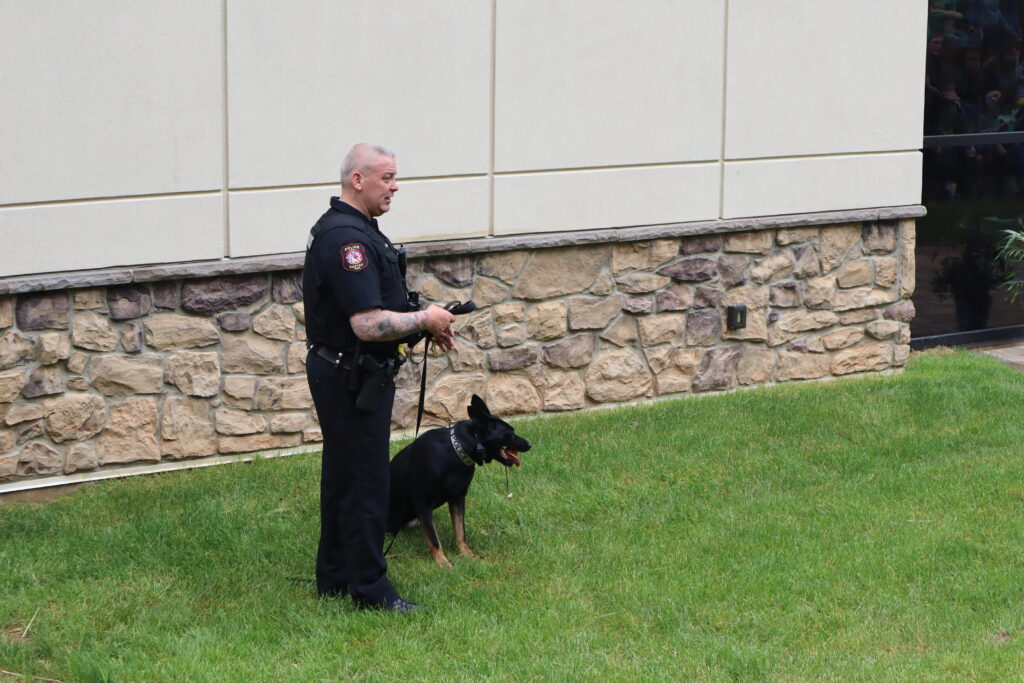On Tuesday, May 6th, Berks County Community Foundation hosted a poverty simulation event at GoggleWorks, facilitated by Community Action Partnership of Lancaster. Dozens of community leaders attended to gain an understanding of the daily struggles faced by individuals living in poverty. School administrators, local government officials, mental health professionals, attorneys, and nonprofit organization staff participated in this event.
Cindy Milian, Health & Human Services Program Officer at the Community Foundation, organized and participated in the simulation. She shared her thoughts after the event: “I felt uplifted to see the variety of community leaders who actively participated in this simulation and voiced their renewed compassion for the Berks County residents who are struggling just to survive. With 41% of Berks County residents living paycheck to paycheck, I’m glad that conversations were had to discuss how we can all play a part in reducing the barriers faced by those living in poverty.”
To learn more about this event, email Cindy at cindym@bccf.org.
In November 2024, Kevin K. Murphy wrote a blog post about Spotlight PA and the importance of local news. He detailed the path taken by the Community Foundation to support the launch of a Berks County news bureau and highlighted the opportunity for in-depth reporting that Spotlight PA would provide for our residents.
We have watched with anticipation as Spotlight PA hired first-class journalists to join the team led by CEO and President, Chris Baxter and Managing Editor, Lisa Scheid.
This week, Spotlight PA announced the upcoming launch of their daily e-newsletter, Good Day, Berks, which will debut on May 5, 2025. It will provide important news about Berks County all in one place, provide a unique perspective into what’s happening in our communities, and highlight Spotlight PA’s local reporting. Readers can expect news about business, events, municipal and school board meetings, and news from across the state.
Berks County Community Foundation was at the very forefront of the national effort to address the need for local news. We are delighted to see that Spotlight PA is taking this next step. To sign up to receive the newsletter, click here.
To learn more about Spotlight PA’s Berks news bureau, please join us for an in-person Community Forum on June 5, 2025. Registration information can be found here.
READING, PA (April 9, 2025) – Berks County Community Foundation is pleased to announce the conclusion of its 1st quarter grant cycle for calendar year 2025, which has successfully distributed vital funding to local nonprofits and initiatives dedicated to improving our community.
In this quarter, the Foundation awarded grants to a diverse range of projects focusing in areas of environment and energy, education, health and human services, arts and culture, and neighborhoods and economic development; supporting the impactful work of local organizations that improve the lives of Berks County residents.
These numbers are a testament to the Foundation’s commitment to its mission to promote philanthropy and improve the quality of life for the residents of Berks County.
- Q1 total grants awarded: 190
- Q1 total dollar amount awarded: $1,152,270
- Q1 number of organizations impacted: 142
“Grants awarded are made possible by generous donors who give back to the community they love,” stated Molly McCullough Robbins, Vice President for Philanthropic Services.
Moving forward, community members are invited to join the Community Foundation in sparking change. Here are two ways to get involved:
- Give to an Existing Fund: Your contributions can help sustain the important work of established funds addressing specific needs within Berks County.
- Create Your Own Fund: Whether you want to honor a loved one or support a particular cause or organization, the Foundation can help you to create a fund that reflects your passions and philanthropic goals.
For more information on how to give or create a fund, please visit www.bccf.org, email Molly McCullough Robbins at mollyr@bccf.org, or call (610) 685-2223.
###
Berks County Community Foundation is a nonprofit corporation serving as a civic leader for our region by developing, managing, and distributing charitable funds to improve the quality of life in Berks County, PA. More information is available at www.bccf.org.
One of the most pressing issues facing Berks County – and many communities across the country – is poverty. Poverty is not just an individual struggle–it is a community-wide concern. While poverty is often viewed as a stand-alone issue, the reality is that it’s deeply interconnected with many aspects of our lives, including physical and mental health, family relationships, cognitive development in children, and the risk of homelessness and violence.
To address these complex issues and spark meaningful conversation, we invite you to a Poverty Simulation. This unique, interactive workshop is designed to provide participants with a deeper understanding of the challenges faced by families living in poverty, and more importantly, to inspire action toward solutions.
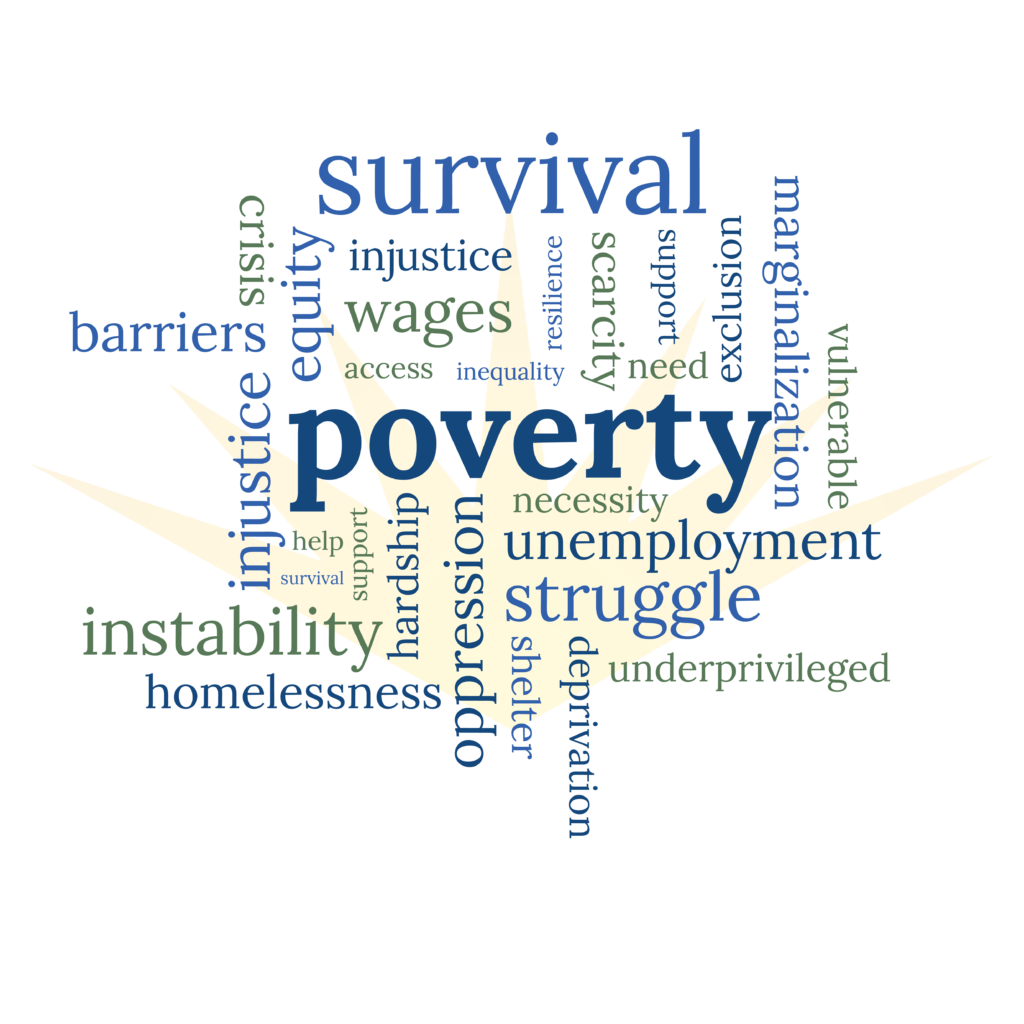
What is a Poverty Simulation?
The Poverty Simulation is a role-playing exercise where participants are assigned a new persona and family profile that reflects the realities of low-income families. Over the course of the simulation, participants navigate through daily tasks—tasks that many of us take for granted, such as paying bills, buying groceries, and finding transportation.
However, the experience isn’t just about completing these tasks—it’s about realizing how hard it can be to meet even the most basic needs when financial resources are limited. The outcomes of the simulation are unpredictable, and participants are often surprised by how difficult it is to make ends meet.
The Poverty Simulation offers participants a rare opportunity to walk in the shoes of someone facing these challenges. It helps participants see firsthand how factors like limited access to resources, transportation, and support networks can impact the ability to thrive. The hope is that by experiencing this, individuals will gain empathy and a deeper understanding of the barriers that many in our community face.
After the simulation, participants engage in meaningful discussions about how our community can address these challenges. They are prompted to think critically about the systems in place and explore how we can all work together to create solutions that lift people out of poverty and support families in need. Participating in the Poverty Simulation is an opportunity to not only gain insight into the realities of living in poverty, but also to be part of a larger movement toward change.
Whether you’re a business leader, educator, healthcare professional, or simply a concerned citizen, your involvement in these discussions can help make Berks County a more equitable place for everyone. After participating in the poverty simulation, community leaders will be equipped to make decisions in their work while keeping the barriers faced by the people they serve in mind. Join us in this vital effort to make a difference. You can RSVP to the event by clicking here.
On March 29, 2025, approximately 145 guests gathered at the Berkshire Country Club to honor Ramona Turner Turpin with the 2025 Thun Award. The Thun Award was created in 1988 to honor Louis R. Thun and Ferdinand K. Thun, local industrialists and philanthropists, in recognition of their long-standing record of civic and community service. The award is presented to Berks County residents whose commitment of time, leadership, and philanthropy exhibits the enduring sense of community reflected by the high ideals of the Thun family.
Fulton Bank and Berks County Community Foundation proudly presented the 2025 Thun Award to Ramona Turner Turpin for her extraordinary community contributions, engagement, and philanthropy in Berks County. Ramona is an Instructor at the Literacy Council of Reading-Berks. Early in her career, Ramona was employed by Berks County Intermediate Unit – first as a teacher, then as an early childhood education coordinator. She served as the Dean of Leadership and Director of Funds Development for the I-LEAD Charter School in Reading. Ramona’s banking career began as the Community Reinvestment Act Director for Bank of Pennsylvania before she was named Community Relations manager for Sovereign Bank in 1999, a position she held for almost ten years. In addition, she held the role of Small Business Specialist for three years.
Ramona has served on numerous boards, including Berks County Community Foundation, Reading Musical Foundation, Olivet Boys and Girls Club, BCTV and United Way of Berks County. She has volunteered her time with Berks Intercultural Alliance. Ramona is a long-time member of Bethel African Methodist Episcopal Church where she has shared her time and talents as a teacher, choir member, and Christian education director; she presently sits on the steward board. Ramona has received numerous awards, including the Athena Award, the Outstanding Woman award from Girl Scouts of Eastern Pennsylvania, the Amiga Award from the Latina Gathering, and the NAACP Image Award.

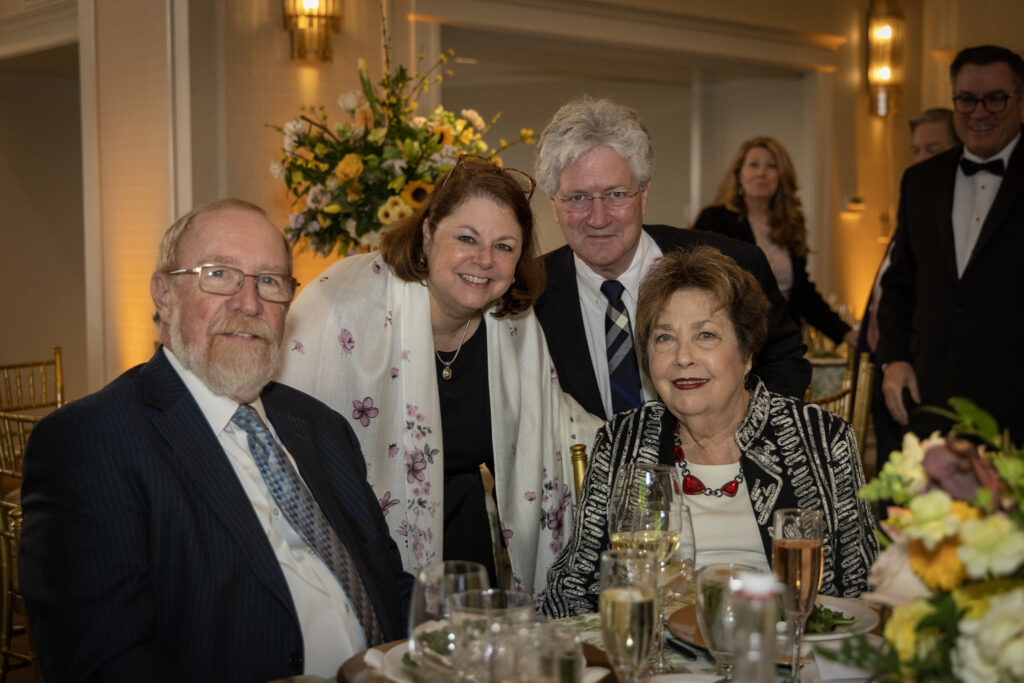
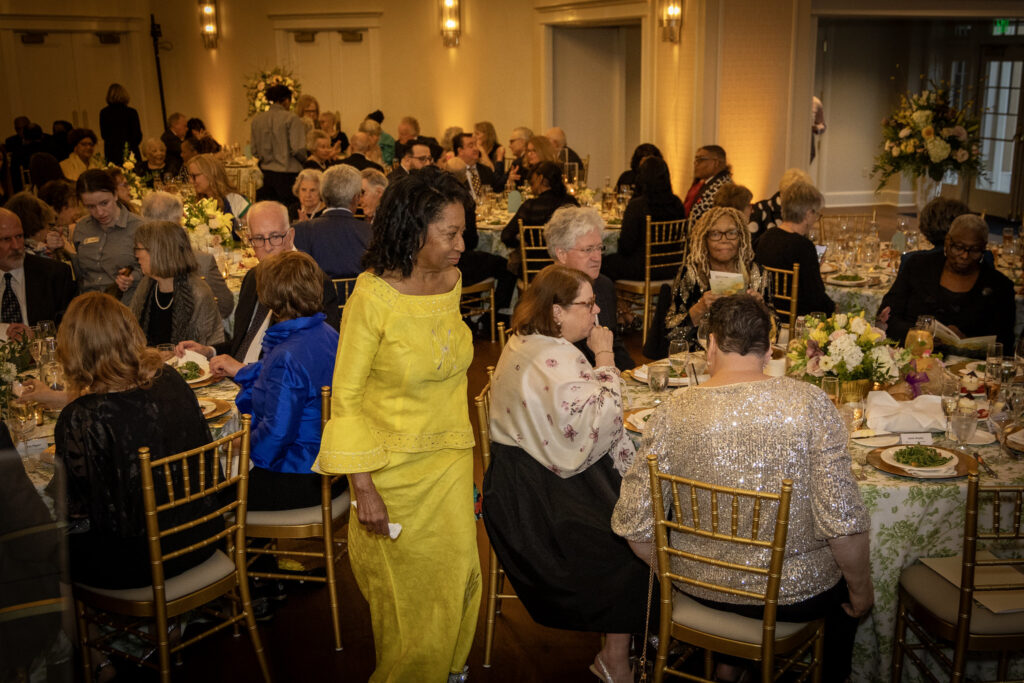


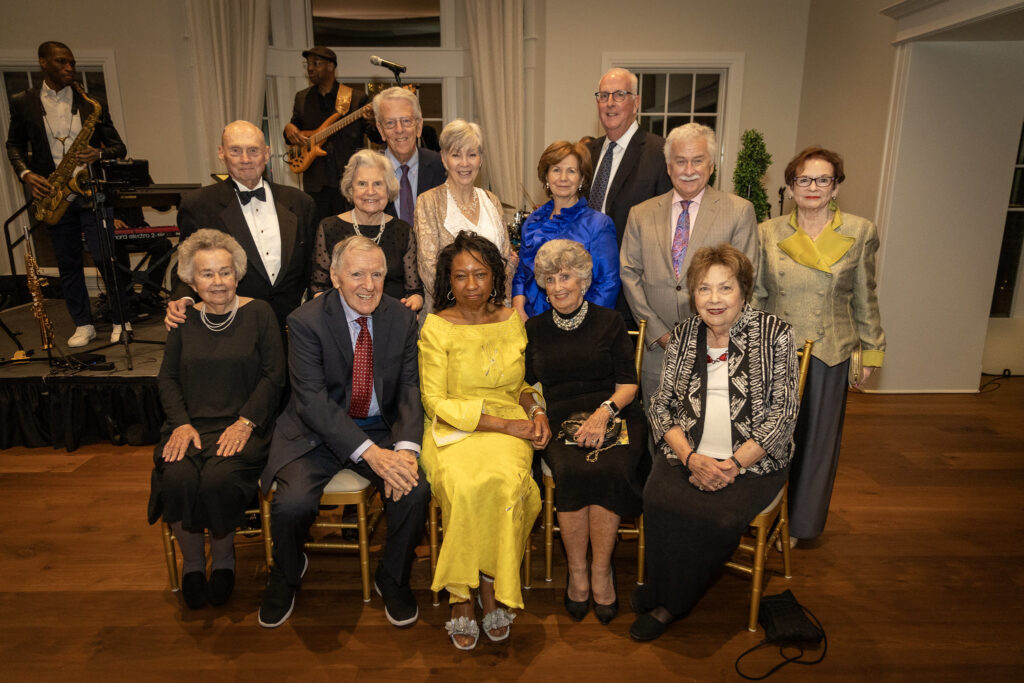
Previous Recipients of the Thun Award:
- 1988: Ferdinand K. Thun and Louis R. Thun
- 1989: Gertrude Sternbergh
- 1990: H.O. “Mike” Beaver
- 1991: Eugene L. Shirk
- 1992: Severin Fayerman
- 1993: Albert Boscov
- 1994: Paul and June Roedel
- 1995: Sidney and Barbara Kline
- 1996: Samuel A. McCullough
- 1997: Dr. Charles A. Carabello
- 1998: John F. Horrigan Jr.
- 1999: T. Jerome and Carolyn Holleran
- 2000: P. Michael Ehlerman
- 2001: Robert W. Cardy
- 2003: Thomas P. Handwerk
- 2004: Karen A. Rightmire
- 2005: David L. Thun
- 2007: DeLight E. Breidegam
- 2008: Gordon G. Hoodak
- 2013: C. Thomas Work
- 2014: Irvin and Lois E. Cohen
- 2015: The Honorable Arthur E. Grim and Louise C. Grim
- 2016: Christ “Chris” G. Kraras
- 2017: Carole and Ray Neag
- 2018: Carl D. and Kathleen D. Herbein
- 2022: Julia Klein and Eric Jenkins
Thun Award recipients are community advocates who are leaders in commerce and industry. This year’s award recipient embodies the passion for and investment in this community, qualities that are found in all the recipients of the Thun Award.
Berks County Community Foundation established the Thun Award Fund from which honorees recommend grants to organizations of their choice. Ramona selected The Sisterhood of Reading to receive this year’s grant. The Sisterhood of Reading strives to foster a kindred and caring spirit among African American women. Their goal is to mentor young women for the betterment of our community.
Click here to view event photos from the Celebration of Giving and Thun Award presentation. To view the video which highlights Ramona’s contributions to the community, visit our YouTube page here. For more information about the Thun Award, please email me at mollyr@bccf.org.
Thanks to the generosity of our community, Berks County Community Foundation now manages nearly 400 funds totaling over $140 million. Since we were founded in 1994, donors have worked with us to establish these funds to support the causes and organizations that are most important to them. Are you interested in giving back to your community? Sparking change in Berks County starts with defining your charitable goals. We can help you achieve those goals, no matter the cause or motivation. Let us help make a difference to what matters most to you.
One way to spark change is to determine how you want to support the community. What causes interest you most? We have created a short questionnaire to set your journey of generosity in motion. The questionnaire starts by asking, “What do you hope to achieve with your fund?”
Different funds fulfill different charitable goals. When you create a fund with Berks County Community Foundation, do you want grants from your fund to support:
- A variety of community needs as determined by the Community Foundation
- A specific organization (or multiple organizations)
- A cause I care about, not a specific organization
- Different nonprofits that I select each year
- Individuals seeking an education
- Individuals who excel at something
Once you’ve narrowed down your goals, it’s time to talk to us. We will work with you to draft a fund agreement which details your wishes and eligibility parameters for future grant recipients from your fund.
In this three-part series, we will explore endowment funds, sparking change, and grantmaking. At Berks County Community Foundation, we do all three. Whether you’re a nonprofit leader, philanthropist, or community advocate, this series will provide insight into how strategic funding can shape a better future.
If you have questions, please email me at mollyr@bccf.org or call 610-685-2223. I look forward to hearing more about you and how you would like to spark change in our community.
On February 26th, Berks County Community Foundation held a reception at Vintner’s Table in Wyomissing, attended by over thirty-five professional advisors. The event was an opportunity for us to thank the professional advisors who, by introducing the Community Foundation to their clients, allow us to continue our mission of promoting philanthropy and improving the quality of life for Berks County residents.
Other staff members present included Kevin K. Murphy, President; Monica Reyes, VP for Programs & Initiatives; Molly McCullough Robbins, VP for Philanthropic Services; Erica Caceres, Communication Manager; Vivi Anthony, Executive Assistant, and our team of program officers.
Cindy Milian, Health and Human Services Program Officer, oversees grants for individuals, public health initiatives, human services initiatives, and animal welfare.
Emily Smedley, Environment and Energy Program Officer, manages programs and grants related to the environment, sustainable energy, land use, and neighborhood vitality.
Kim Sheffer, Lifelong Learning Program Officer, manages the scholarship and educational grant funds.
We enjoyed the chance to mingle with our professional advisor friends and provide updates on Community Foundation work in the community.
Since the Community Foundation was founded over 30 years ago, 50% of the charitable funds we manage have been the direct result of a referral by a professional advisor. In dollar amounts, 76% of our current investment pool is the result of funds referred to us by a professional advisor.
Details on how you can be a referrer and spark change are available in the Community Foundation’s Giving Guide.
If you have questions, please email me at frankia@bccf.org.
As we age, maintaining strength, balance, and flexibility becomes essential for staying active and independent. Recognizing this need, the Home Health Care Foundation Fund of Berks County Community Foundation provided a grant to support older adults in their wellness journeys. Through a grant awarded to the TriCounty Active Adult Center’s Fitness Program, older people in the community now have greater access to a variety of fitness classes designed to improve their overall health and reduce the risks associated with falls.
The TriCounty Active Adult Center, formerly known as the Pottstown Area Seniors’ Center, is a nonprofit community center dedicated to serving individuals aged 50 and above across western Montgomery, northern Chester, and eastern Berks counties. With nearly 100 programs each week, many free or at a minimal cost, the center provides ample opportunities for older adults to stay active, learn new skills and connect with others.
“I decided to go to a class to check it out. It was then that I realized what I had been missing. I’ve met new friendly people and there are many things to do. It filled the void in my life. I felt I had a new life now. Something to look forward to,” one participant mentioned after attending a class.
According to the U.S. Centers for Disease Control and Prevention (CDC), in 2021 falls caused 38,000 deaths among those age 65 and older. The center offers a variety of classes for all abilities to help people over 50 improve their strength, stamina, flexibility, and balance to avoid falls and to reduce the severity of injuries when falls do occur.
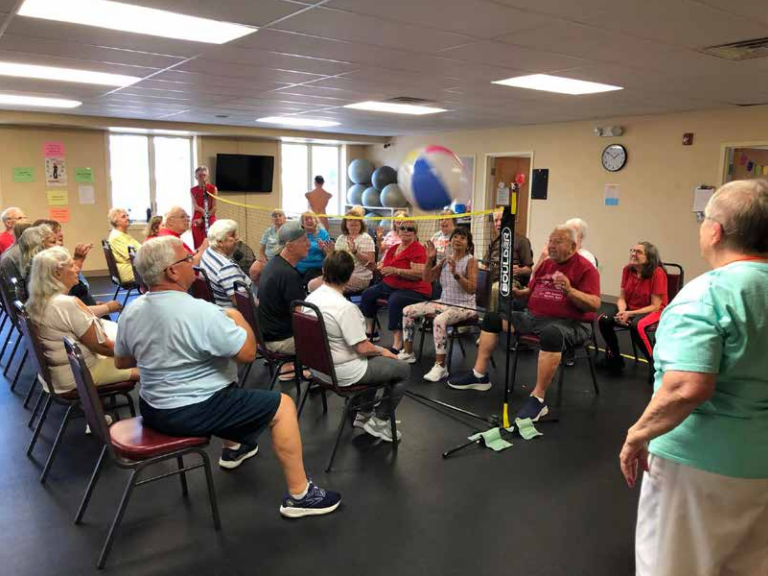
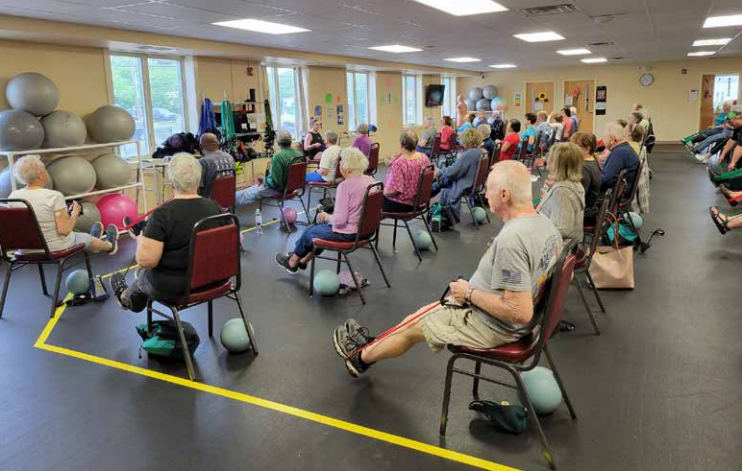

The grant from the Home Health Care Foundation Fund of Berks County Community Foundation supports programs and organizations that benefit the health of residents in Berks County and surrounding counties. Since 2019, this fund continues to be a crucial resource for supporting health and wellness efforts across the region, ensuring that older adults have the tools and resources they need to age well. You can read more about the fund by clicking here.
Together, we can build a stronger, healthier future for all!
There are many ways to support nonprofit organizations. You may make a one-time gift to support an event or program. You may give annually to your favorite organization. Perhaps you volunteer your time and talent to offset costs for a charity that is important to you. You could also establish an endowment fund. An endowment is a fund or group of funds that provides long-term support for a cause or organization. It is established with the intention to live on forever. Establishing an endowment fund with Berks County Community Foundation is a long-term way to support the organizations and causes that matter most to you. The endowed fund is invested, and a portion is given out each year for grantmaking to fulfill the charitable intent set forth by the donor(s). As the invested balance grows, more is available for distribution over time.
How does it work?
- An individual, group, or organization completes a fund agreement to specify the details of the fund and the charitable intent of the donor(s) and makes a gift to establish a fund with Berks County Community Foundation.
- Berks County Community Foundation manages and invests the fund to grow the balance.
- Each year, a portion of the fund (4.5%) is distributed based on the charitable goals set forth in the fund agreement.
- The remaining funds are kept in the endowment to grow over time.
Why is it important?
- Endowments provide an ongoing source of funding for charitable causes.
- Endowments can help nonprofit organizations that the donor selects expand their support and develop new programs.
- Endowments can help those organizations weather economic downturns.
How can I contribute?
- You can donate cash, stocks, real estate, or other assets to an endowment.
- You can receive tax benefits for your donation in the year you give.
- You can create a legacy of support by establishing an endowment.
- Others may give to existing endowments to increase their grantmaking dollars.
Berks County Community Foundation assesses management fees on the charitable funds it administers. These fees support costs for grant processing, contribution acknowledgment, audits, tax filings, and personnel. These fees are crucial to allowing us to fulfill our mission to promote philanthropy and improve the quality of life for the residents of Berks County.
Effective stewardship of philanthropic assets is key to our mission. The endowment funds we manage will live forever, and so will Berks County Community Foundation. We will never leave the area or go out of business, so we will always be here making the community a better place to live.
In this three-part series, we will explore endowment funds, sparking change, and grantmaking. At Berks County Community Foundation, we do all three. Whether you’re a nonprofit leader, philanthropist, or community advocate, this series will provide insight into how strategic funding can shape a better future.
To learn more about establishing an endowed fund with Berks County Community Foundation, please download our Giving Guide and feel free to email me at mollyr@bccf.org.

Police K9 units play a vital role in keeping our communities safe. These hardworking dogs help officers track suspects, find missing people and detect illegal substances. But, maintaining a skilled and effective K9 unit requires continuous funding for training, equipment and proper facilities. That is where the Darrell and Gloria Rank K9 Corps Fund of Berks County Community Foundation can help.
This fund provides grants to help train, purchase and maintain K9 units for governmental entities in Berks County. Right now, applications are open for organizations that need funding to support their K9 teams.
How was the fund created? Darrell and Gloria Rank dedicated their lives to making Berks County a safer place. Darrell was the first executive of the Berks Earned Income Tax Bureau and took action when his community needed him most. He once rescued a woman from a flooded car in 1972 during Hurricane Agnes and helped bring a dangerous criminal to justice after witnessing an assault.
When Gloria passed away in 2012, she left most of her estate to Berks County Community Foundation, ensuring that their commitment to public safety would continue. Today, the Darrell and Gloria Rank K9 Corps Fund honors their legacy by providing essential resources for K9 units in the county.
How is this fund making a difference? A recent grant was used to update and maintain two K9 facilities where police dogs are housed and trained. These facilities are critical for keeping the unit efficient and ready for duty. The grant covered the cost of materials and labor to complete much-needed improvements, ensuring the facilities are still safe and functional for years to come.
The project was delayed due to circumstances such as switching contractors. However, the team worked hard to overcome challenges and keep the upgrades on track. Thanks to this funding, K9 handlers and their dogs now have a safer and more effective training environment.
The Darrell and Gloria Rank K9 Corps Fund of Berks County Community Foundation is currently accepting applications to help provide essential funding for K9 training, equipment, and facility maintenance. To apply, click here.
